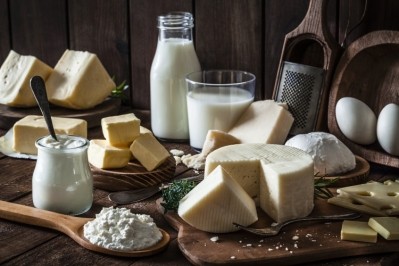‘An incredible opportunity’: Technology based on cell programming could revolutionize dairy waste upcycling

Foremost Farms will leverage Ginkgo's bioproduction services – particularly, strain optimization - to develop and commercialize a new technology that’s more environmentally-friendly than existing chemical production methods all while enabling the dairy to upcycle billions of pounds of dairy co-products each year. These co-products will be turned into other industrial inputs, creating new revenue streams for the dairy while helping it to lower its carbon footprint and manufacturing costs.
But how does it all work exactly? We spoke to Ginkgo Bioworks’ Jack Cavanaugh, associate director on the company’s commercial team, and Sneha Srikrishnan PhD, senior director of business development, to find out more about the project, details of which are still being kept confidential.
Producing value-added materials from waste
Ginkgo Bioworks is a biotechnology company that offers cell programming services for various markets, from food and agriculture to pharmaceuticals and the chemicals industry. The company also runs a biosecurity and public health unit where it leverages science and artificial intelligence to detect biological threats.
“Our most popular services in the dairy industry are our Ginkgo Enzyme Services for developing better enzymes and Protein Expression Services for alternative protein production,” Jack Cavanaugh explained. “These are part of our tailored suite of GM and non-GM organism engineering services for the alternative protein ingredients market, including production of nature identical protein sequences as dairy ingredients. We have developed GRAS strain assets - yeasts and filamentous fungi - that can ‘speak’ to COGs [cost of goods sold] reduction for fermentation of protein ingredients such as whey proteins or caseins, improved media and fermentation conditions for the strains developed, and unique non-GM approaches that can be applied to microbes as probiotics, or for upcycling dairy waste.”
While upcycling co-products such as whey and lactose isn’t new, the process can be expensive, energy-intensive and not as accessible to producers that cannot afford the investment in equipment or space. This is where the new technology comes in.
“Because the breakdown of waste is so often biological, we can take the same microbes that consume waste and engineer their metabolisms to produce inputs to other parts of industrial processes,” Cavanaugh explained.
“This helps companies close the loop in their circular manufacturing and supply chains, and gives them an opportunity to both save on waste disposal costs and on input procurement costs, all while helping the planet.”
This would also allow Foremost Farms to access markets that had not been viable for upcycled waste previously, we were told.

“Upcycling this waste stream is not novel, but working with Ginkgo to design a solution that is globally competitive without by-products and other capex risk, is novel,” Cavanaugh concluded.
While details about the technical aspects of the project – including what type of dairy co-products will be upcycled – are kept under wraps, Cavanaugh said that “it’s worth highlighting that valorization, or the production of valuable materials from what companies might consider waste, is an incredible opportunity that cell engineering can help companies realize”.
A time frame on when the technology will be finalized has not been set either. “As with all our collaborators, we’ll provide updates on this program in partnership with Foremost as best serves our partners’ competitive footing,” Cavanaugh told us.
Strain engineering for Vivici
Besides working on creating a biotech solution for upcycling dairy co-products with the Midwest dairy co-operative, Ginkgo Bioworks also recently announced a collaboration with precision fermentation dairy start-up Vivici. Ginkgo is set to deliver ‘optimized strains for dairy protein production via precision fermentation’. This will involve screening for strains with the best protein expression, growing the most promising strains and offering these to Vivici for evaluation. All this with the aim to develop and commercialize a new generation of functional alt proteins, specifically animal-free protein.
According to Ginkgo’s Sneha Srikrishnan PhD, senior director of business development, precision fermentation has recently seen an increase in ingredient development for whey proteins and caseins, as well as lactoferrin. The benefits of the manufacturing process are several.
“Precision-fermented dairy ingredients offer additional benefits compared to traditionally-sourced dairy such as less environmental impact, shorter supply chains, and animal-free claims,” she said. “Dairy ingredients are great targets for precision fermentation as they provide nature-identical amino acid content, can be controlled in terms of purity of product (reduced by-product profile) and can be blended or formulated as ingredients into alt dairy products or hybrid foods to provide functionality (creaminess, texture or stretch) which could be a challenge for plant-derived ingredients alone.
“Finally, guidelines on usage rate limits of alternative protein ingredients in formulations (infant, or sport for example), can be very helpful to determine the role of and demand for precision fermented ingredients in the not-so distant future.”
Asked what were her hopes about the industry’s development going forward, she told us: “It would be great to see regulatory bodies open to natural-similar proteins, which may have different and beneficial post translational modifications – glycan profile for example – to improve on cost of production of these proteins via fermentation and better margins to producers.
“Precision-fermented dairy ingredients are the exact same molecules that are found in nature but are generated using a different process than animal agriculture.”
Clarity on novel foods, new hybrid foods and food safety rules would also be ‘a step in the right direction,’ she added, and would help bridge taste, off-flavor or texture gaps that prove challenging for plant based solutions.






















